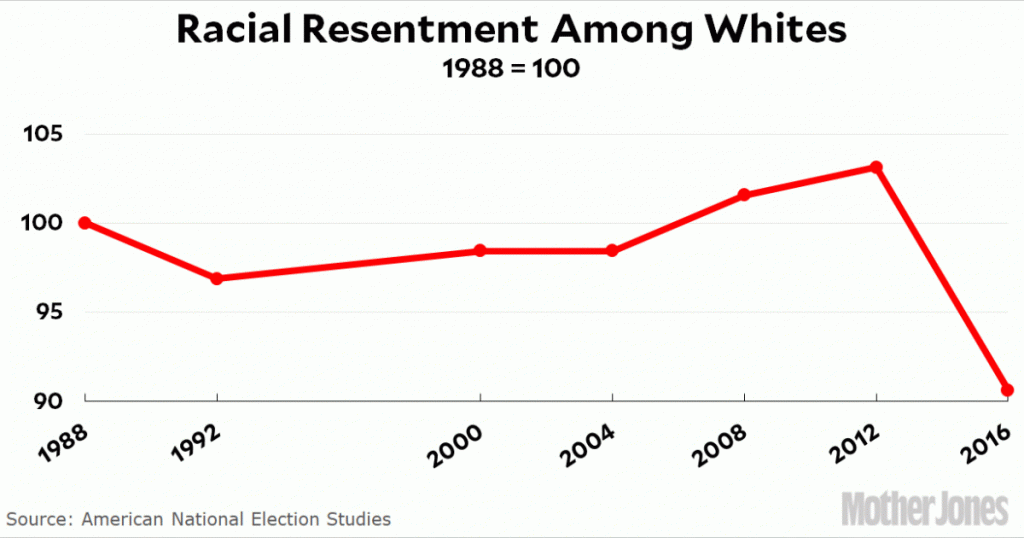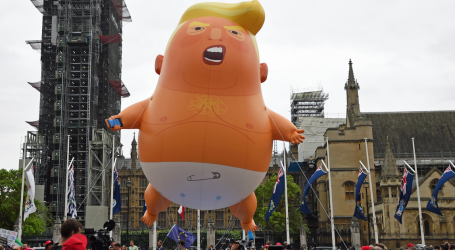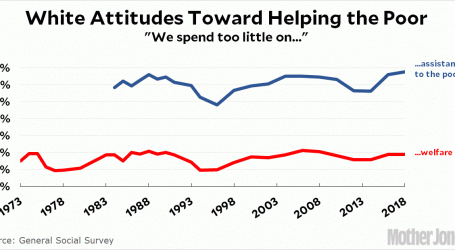White Racial Resentment Hasn’t Become More Politically Powerful Recently
Looking for news you can trust?Subscribe to our free newsletters.
“White racial resentment has been gaining political power for decades,” says the Washington Post. But I have some problems with this. For starters, the two authors¹ present a chart which, they say, “shows that racial resentment hasn’t fluctuated much over time.” I’ve redrawn it to make clear just how misleading this is:
In fact, using their particular metric of racial resentment, we saw a large and surprising fall in racial resentment in 2016—precisely the time when we all assumed that a rise in racial resentment was powering Donald Trump to the presidency. That’s interesting enough that it deserves some analysis. But one way or another, if you take this metric seriously you need to explain why racial resentment suddenly dropped so abruptly after years of staying flat.
Having ignored that, the authors go on to say that even if racial resentment has stayed about the same, it’s become more powerful as a political force:
As you can see, every political variable we measured has become more closely correlated with racial resentment over time. For instance, racially resentful whites had a variety of attitudes toward health insurance in 1988. But by 2016, highly racially resentful whites strongly opposed public health insurance while those with little racial resentment strongly supported it. And for every variable except voting for the Republican Party candidate, the correlations between racial resentment and all these political variables have tripled over time.
Here’s the chart:
This doesn’t show that everything has become more correlated with racial resentment. It shows that everything has become more correlated, period. We used to have liberal Republicans and conservative Democrats, and now we don’t. The parties have polarized, and members of the parties increasingly agree with each other about everything. You could redraw this chart to show increasing correlation with health care, government services, abortion, gun rights, party ID, or practically anything else.
You might think this is nitpicking. It’s not. Here’s what the authors conclude from this:
These results suggest that white voters use their attitudes toward race to guide political decisions three times as much today as they did just 30 years ago….One apparent reason has been that political elites — politicians, party leaders, the political media and so on — have increasingly indulged in what scholars call “racial priming.” Those are the subtle and not-so-subtle messages that encourage citizens to base their opinions at least in part on racial considerations.
Unless I’m missing something, this is just wrong. All voters—not just whites—have sorted themselves into their natural political parties over the past 30 years. This is what guides political decisions, not any single aspect of those parties. You could just as accurately say that attitudes toward abortion guide the political decisions of whites, and it would be just as wrong.
There’s also no evidence I’m aware of that party leaders have indulged in “racial priming” more over the past three decades. I’d guess less, in fact, though I’d want to see some evidence. In any case, the one politician who clearly did indulge in more racial priming is Donald Trump, and that coincided with a drop in white racial resentment and a drop in the Republican share of the white vote.
This strikes me as a real abuse of statistics. It’s possible that racial resentment has become more politically potent for whites over the past three decades, but nothing here demonstrates that. All it shows is that as liberals and conservatives have sorted themselves into Democrats and Republicans, everyone’s attitudes toward everything have become more highly correlated. At the same time, white racial resentment in general has declined. Analyzing what this means might produce an interesting result, but this isn’t it.
¹Adam Enders, an assistant professor of political science at the University of Louisville, and Jamil Scott, a PhD candidate in political science at Michigan State University.





